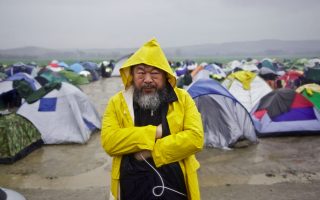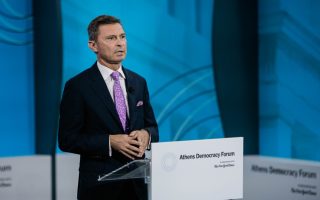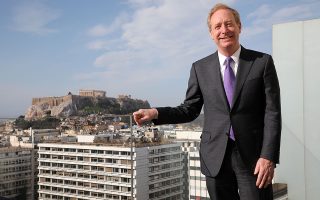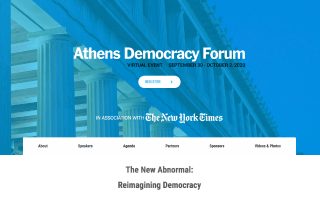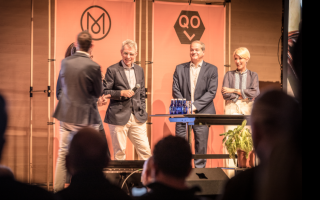Athens Democracy Forum aims to build trust and resilience
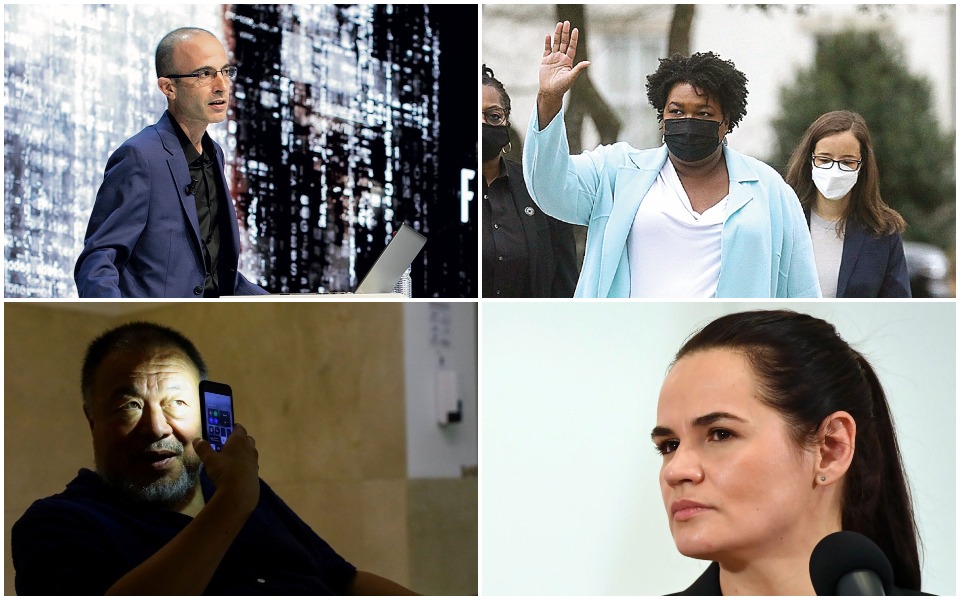
Nearly two years into the pandemic and many years into a steady rise of populism, what is the state of democracy in the world? How resilient are its institutions, and which of them need to be completely reimagined? How can we regain trust – in our leaders and in each other?
These are just a few of the questions that will be explored at this year’s Athens Democracy Forum, taking place from Wednesday through Friday at the National Museum of Contemporary Art (EMST), the Hotel Grande Bretagne and the Stoa of Attalos. The forum, in its ninth year, is organized by the Democracy & Culture Foundation in association with The New York Times and will be livestreamed for free via athensdemocracyforum.com.
We’ve assembled an inspiring roster of speakers, including luminaries like the historian Yuval Noah Harari, the political leader Stacey Abrams, the artist Ai Weiwei and Sviatlana Tsikhanouskaya, the democratic leader of Belarus – to talk through crucial issues like the climate crisis, geopolitical shifts and democracy’s fraught relationship with technology. The forum’s signature mix of politicians, nonprofit and business leaders, academics and activists will ensure that speakers don’t just catalogue problems but debate concrete solutions.
These kinds of solutions will be on display on Wednesday during a pre-forum event that highlights the work of the Democracy & Culture Foundation. Ideas from last year’s ADF have evolved into projects supported by the foundation and its partners, from a program helping refugee minors to a climate hub for the Mediterranean region and a democracy platform for teens. The day will culminate in a talk titled “Democracy and Technology: Catch Me if You Can,” featuring Harari, the Greek minister for digital governance, Kyriakos Pierrakakis, and Dubravka Suica, the European Commission’s vice president for democracy and demography.
The forum will officially open that evening with a discussion on “Geopolitics in Crisis Mode,” followed by a keynote conversation between Abrams and Patrick Healy, the deputy opinion editor for The New York Times. They will discuss Abrams’ voting rights activism and how it relates to strong sustainable democracy, and how those lessons can be applied in other established or fragile democracies. To cap the day, the mayor of Athens, Kostas Bakoyannis, will present the city’s annual Democracy Award to Wai Wai Nu, who advocates for the rights of women and all citizens in Myanmar.
The second day will kick off with an opening “provocation” from the author Parag Khanna and his predictions for how the world’s 4 billion youth will reshape societies, followed by a keynote dialogue between Prime Minister Kyriakos Mitsotakis of Greece and Steven Erlanger, The New York Times’ chief diplomatic correspondent in Europe. Other highlights on Thursday include a tutorial by four experts with fresh ideas for how to engage citizens; a talk by the author Shoshana Zuboff on “Surveillance Capitalism and the Democratic Counter-Revolution,” and a conversation between the renowned economist Joseph Stiglitz and Prime Minister Eduard Heger of Slovakia.
That evening delegates will move to the historic Stoa of Attalos to discuss a modern-day question: At a time when many people have become thoroughly disenchanted with institutions and with leaders, how can one build trust and resilience? Kwame Anthony Appiah will frame the question from a philosophical standpoint before we hear from Harari, Tsikhanouskaya and the young politician and activist Mete Coban.
The third day of the forum will continue the debate around issues of trust with a robust conversation about the problem of disinformation. The panel will feature a who’s who of experts on the subject: Christophe Deloire, the executive director of Reporters Without Borders; Maria Ressa, the CEO of Rappler in the Philippines; Stephen King, the CEO of Luminate; and Irene Braam, the executive director of the Bertelsmann Foundation.
Later that day, another group of panelists will discuss why it’s so hard to make meaningful progress in combating the climate crisis, and what can be done about it. Then two politicians with unique perspectives – Tsikhanouskaya and the Hungarian minister of foreign affairs and trade, Peter Szijjarto – will discuss divergent paths to democracy. The entire forum will wrap up with a forward-looking exploration of how art can galvanize change, with examples from practitioners including Irina Bokova, the former director general of UNESCO, and the artist Ai Weiwei.
The ultimate goal of the Athens Democracy Forum is to take the lessons learned over the three days of exchanges and weave them into the foundation’s projects, to further its mission of producing “citizen engagement” and “better governance.” Ideally, the discussions will also inspire other individuals and organizations to move beyond words, and implement the third pillar of the foundation’s core motto: “Think. Talk. Do.”
Kim Conniff Taber is the editorial director for the Athens Democracy Forum and Democracy & Culture Foundation.
